Ah, the chocolate chip cookie. While it is a simple, beloved dessert, it seems like everyone has an opinion on it. Even in my home, I’m constantly debating with my family about what constitutes the perfect chocolate chip cookie. Should it be crispy or chewy? Golden or underdone? Flat or pillowy? Plus, with so many different baking methods to choose from, it turns baking a simple chocolate chip cookie into a complex science experiment—one I happily dove into.
While the actual recipe of the cookie dough does matter for your cookies (we’re big fans of these 33+ cookie recipes), for this experiment, we wanted to narrow down the best baking method for cookies. Should you line your baking sheet with parchment paper or aluminum foil? Or should you just spray it down and leave it as is?
We did a deep dive into each baking method, evaluating the look and the taste of the finished cookies for each one, determining which method seems to reign supreme over all. Here’s what we found, and for more baking tips, here are the 23 Best Baking Tips of All Time.
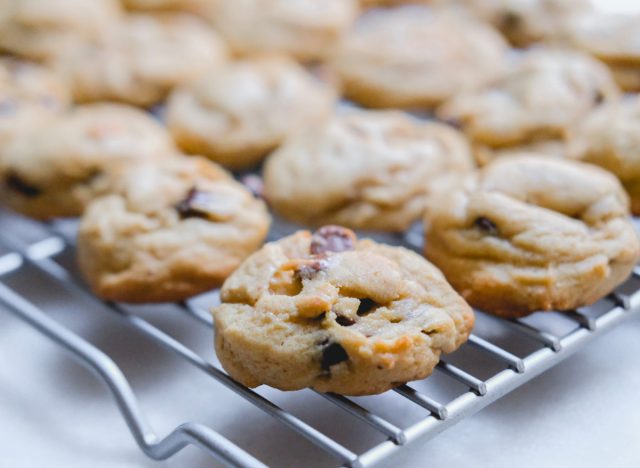

In order to have a proper comparison of all three baking methods, I set a few ground rules to ensure that the cookies remained on the same playing field for each baking method, to ensure that the comparison of each method was more about the baking versus the type or temperature of the cookie. Here are a few guidelines I set to get started:
- For this cookie experiment, I used our classic Chocolate Chip Cookie Recipe.
- From my experience, aging the dough gives the cookie an exceptionally rich flavor and helps the cookie to retain some structure. “Aging the dough” means letting it sit in the fridge anywhere between 30 minutes and up to a few days. For this experiment, I balled up my cookies into 2-tablespoon portions and aged them in the fridge for 24 hours.
- When it was time to bake, I kept the cookies cold in the fridge before placing them on the baking sheet and into the oven as I tested each baking method. I did not leave the cookie dough out to ensure that the cookies all start at the same temperature.
- For further temperature control, each cookie was placed on a completely cooled baking sheet before going into the oven.
- I did not bake them all at the same time—each baking method had its own time in the oven to give it the same heat distribution as the others.
- All of the cookies were baked in the middle of the oven on the same rack, baking at a preheated 375-degree oven.
- Each cooking method had 10 minutes in the oven, then the cookies sat on the cookie sheet for 5 minutes after baking before I removed them to a cooling rack to do a taste test. While there is some debate around leaving cookies on the sheet pan so they don’t overbake, I find moving hot cookies right away could result in a hot, mushy cookie disaster. So to give them time to harden and retain some shape, I chose to bake my cookies with a smaller amount of time and give them time to set on the sheet pan.
So which baking method proved to be superior? Let’s dive in.
Make better eating choices every day by signing up for our newsletter!
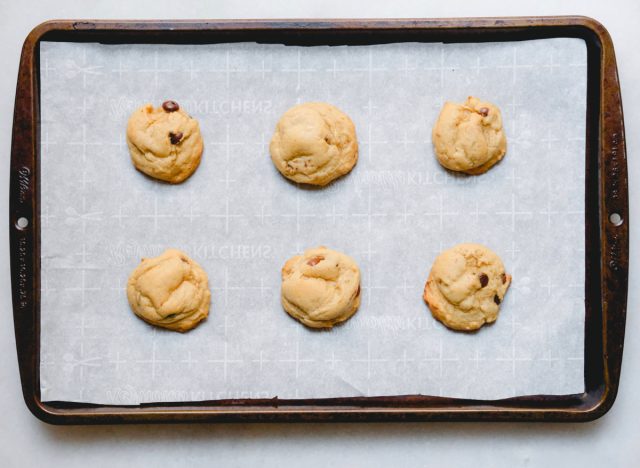

Parchment paper generally seems to be a go-to for many at-home bakers, known for its non-stick qualities and ability to resist humidity. But does it really live up to the hype? Here was our thoughts on our parchment paper cookies:
Look: The cookies are pillowy and soft, but perfectly golden around the edges. The bottoms were not overcooked and also perfectly golden. The cookies did not spread out much, and are pretty fluffy and pillowy at the top even after letting them cool slightly. There don’t seem to be any undercooked spots along the top of the cookie.
Taste: Absolutely perfect. The inside is chewy and soft, and the outside provides that perfect crispy bite. The pillowy nature of the cookie gives it that soft, delectable texture. The centers are not underdone or overdone, making for an evenly baked cookie that melts in your mouth.
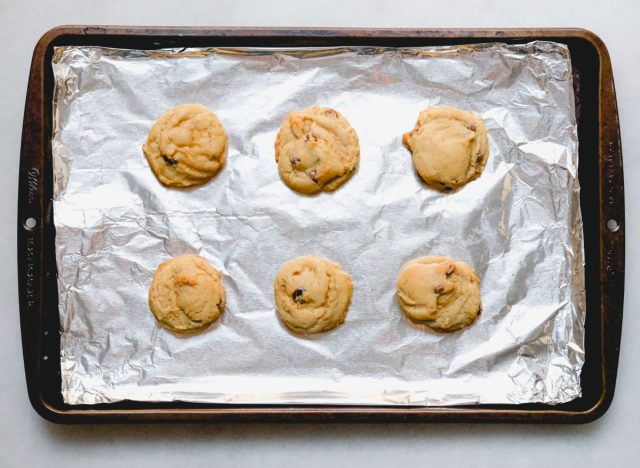

Now I admit, I had my suspicions about baking cookies on aluminum foil. Because it’s another type of metal, I figured it would bring extra heat to the pan and cause the cookies to overbake. Here’s how it turned out.
Look: These are definitely the most golden cookie out of all of these options. Originally I thought the cookie would be overdone because of the extra heat from the aluminum foil, yet the cookie’s golden bottom still matched the same as the parchment paper. The tops certainly have more golden flecks, and the cookie seems firm.
READ RELATED: Dry Swallowing Pills: Why Taking Meds Without Water Is Risky
Taste: While the cookie seemed to be golden and perfect, the inside didn’t exactly cook to my liking. The bottom is certainly crispier than the others, while the top is still chewy and underdone—likely because the aluminum foil retained heat and caused the bottoms to bake more compared to the heat-resistant parchment This method works well for a person who loves the perfect mix of goldenly crispy outside and a chewy, underdone center. Yet it was clear when biting into the cookie that the bottom was cooked, while the top had yet to finish baking.
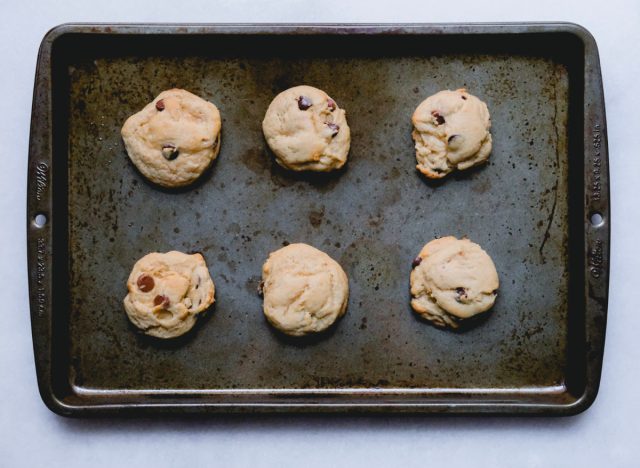

If you find yourself without parchment paper or aluminum foil, will a non-stick spray work just as well? We gave it a test.
Look: These cookies have a nice mixture between parchment paper cookies and aluminum foil cookies. They are pillowy on top yet also golden around the edges. The cookie around the edges seems to have baked evenly.
Taste: Slightly underdone in the middle, but not as much as the aluminum cookie. In terms of evenly cooking, I would say that the nonstick did evenly cook the cookie all the way around the edges, even if the middle was slightly underdone. If I left them in for maybe one minute more they would have been perfect.
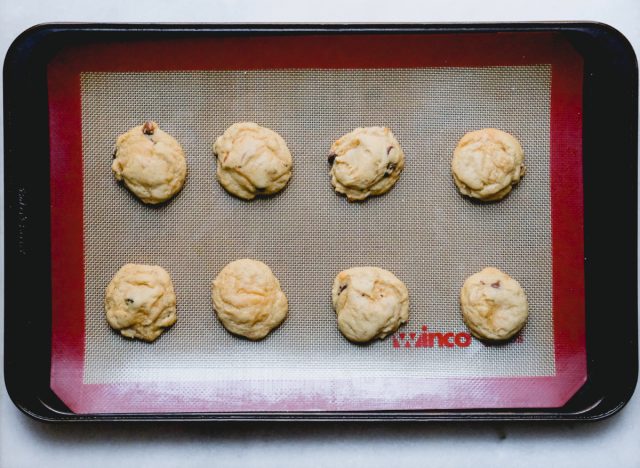

Now I know this wasn’t a part of our original tests, but as someone who bakes with a silicone mat often, I was curious! To recap, a silicone mat is a reusable baking mat you can place on your sheet pan that you can use over and over again, making for less waste in your kitchen. I figured given that pastry chefs sometimes use them that they would be the superior option, but after baking my cookies, I found I may have been wrong.
Look: These cookies did not get golden around the edges, and there is no golden browning on the bottom. The cookies are definitely softer, and don’t have the same firmness as any of the other cookies—they seem to fall apart when I pick them up. The insides seem not as done as the others, with the tops looking underbaked.
Taste: Definitely underdone. It’s chewy for sure, but it almost feels like I’m just chewing on cookie dough. I definitely would want to give it a few more minutes. The silicone mat seems to protect the heat slightly, so it may need a few more minutes of cooking if you want a golden, more well-done cookie. Unless you prefer a chewier, doughier cookie, of course.
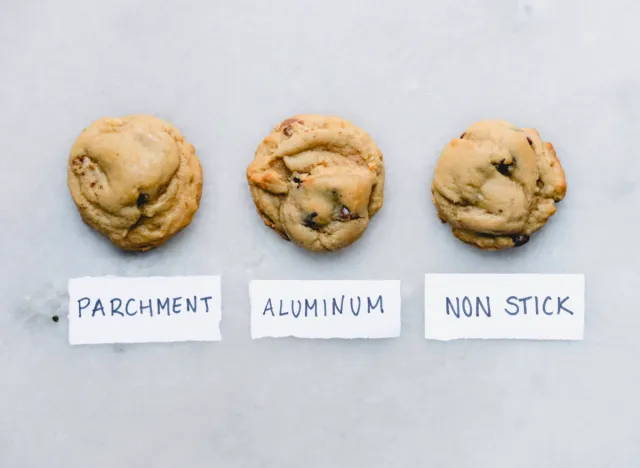

While I was pleasantly surprised by the results of aluminum foil and non-stick spray, I would have to say that parchment paper still is the best for baking cookies. It helps to create an evenly baked cookie, giving it that golden edge and that chewy center we love—while still not having underdone spots in the middle. Looks like I’ll be stocking up on more parchment paper before the holiday baking season rolls around!
Source:










